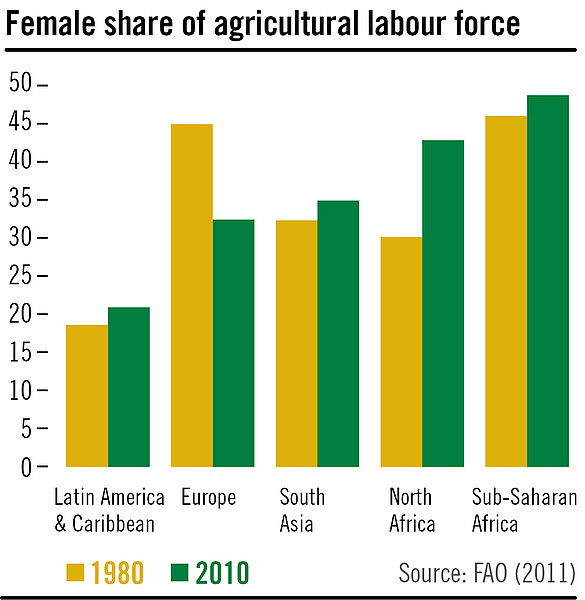Introduction
Women have been instrumental in agriculture for centuries, playing vital roles in planting, harvesting, and ensuring food security for their families and communities. However, they often face unique challenges and obstacles in the agriculture sector. In recent years, there has been a growing recognition of the importance of empowering women in agriculture, not only for gender equality but also for the advancement of sustainable farming practices and global food security. In this article, we will explore the challenges women in agriculture encounter and celebrate the success stories of those who have overcome them.
The pivotal role of women in agriculture throughout history cannot be overstated. They have been the backbone of farming, nurturing the land and ensuring that their families and communities have access to food. However, as we acknowledge their significant contributions, it’s crucial to recognize the challenges and barriers that women often face in the agriculture sector. As we delve deeper into this idea, we also explore the growing recognition of the importance of empowering women in agriculture and how this empowerment contributes not only to gender equality but also to the advancement of sustainable farming practices and global food security:
Unequal Access to Resources: Women frequently have limited access to crucial resources such as land, credit, and agricultural inputs like seeds and fertilizers. This inequality hampers their ability to engage in productive and sustainable farming.
Traditional Roles and Norms: Societal norms often dictate that women’s primary roles should be within the household. These traditional expectations can hinder their participation in decision-making and leadership roles within the agriculture sector.
Limited Training and Education: Women in rural areas may have less access to agricultural training and education, which can impede their ability to adopt modern and sustainable farming practices.
Workload Burden: Women often bear a disproportionately heavy workload, balancing farm labor with household chores and childcare responsibilities. This workload can lead to burnout and limit their capacity for innovation in farming.
Lack of Access to Markets: Women frequently encounter challenges in accessing markets and selling their agricultural products. This can result in limited income and economic opportunities.
Climate Change Vulnerability: Women are often more vulnerable to the impacts of climate change due to their roles in farming and food production. Addressing climate resilience in agriculture is therefore critical for their well-being.
Empowerment for Sustainable Practices: Empowering women in agriculture goes beyond gender equality; it is essential for advancing sustainable farming practices. Women often exhibit strong stewardship of natural resources and are key players in the adoption of sustainable and regenerative agriculture.
Enhancing Food Security: Recognizing the role of women in agriculture is crucial for global food security. They are central to ensuring that communities have reliable access to nutritious food.
Success Stories: Celebrating the success stories of women in agriculture who have overcome challenges can inspire others and highlight the positive impacts of empowerment efforts.
Collaborative Efforts: Governments, NGOs, and international organizations are increasingly recognizing the need to empower women in agriculture. Initiatives aimed at providing women with access to resources, education, and leadership opportunities are gaining momentum.
Gender-Inclusive Policies: Implementing gender-inclusive policies in agriculture is a step toward leveling the playing field. These policies can help address inequalities and create an environment where women can thrive.
Global Impact: Empowering women in agriculture is not only a matter of justice but also a global imperative. It contributes to achieving Sustainable Development Goals related to hunger, poverty, gender equality, and environmental sustainability.
In conclusion, the empowerment of women in agriculture is a multifaceted endeavor that holds immense potential for addressing global challenges. By breaking down barriers and creating opportunities for women in farming, we not only promote gender equality but also advance sustainable agriculture, improve food security, and strengthen communities. The stories of resilient and successful women in agriculture serve as beacons of hope and inspiration, demonstrating the positive impacts of empowerment efforts and the potential for transformative change in the agriculture sector.
Additionally, you can find further information on this topic by visiting this page: In focus: Sustainable Development Goal 5 | UN Women …
Women in many parts of the world have limited access to essential resources such as land, seeds, fertilizers, and credit. These resource constraints hinder their ability to adopt modern agricultural techniques and improve productivity.
The gender disparity in access to essential agricultural resources remains a glaring and deeply entrenched issue in many parts of the world. The unequal distribution of resources, including but not limited to land, seeds, fertilizers, and credit, places a significant roadblock in the path of women who are striving to make a meaningful impact in agriculture and improve productivity.
Land Access: Land is not just a means of production; it’s often synonymous with power and economic stability. Yet, women continue to face considerable challenges when it comes to land ownership or even secure land rights. In many societies, customary laws and traditions favor male landownership, leaving women with limited control over this crucial resource. This limitation curtails their ability to invest in long-term farming strategies and inhibits their economic independence.
Seeds and Fertilizers: Access to quality seeds and fertilizers is essential for maximizing crop yields and sustaining agricultural productivity. However, women, especially in rural areas, often encounter barriers in accessing these critical inputs. Financial constraints and a lack of information on modern farming techniques further exacerbate this issue, making it difficult for women to adopt practices that could significantly enhance their farming outcomes.
Credit and Financial Resources: The financial aspect of agriculture cannot be overstated. Yet, women frequently face difficulties in obtaining credit and financial resources to invest in their farming endeavors. Traditional banking systems may require collateral that many women simply do not possess, which limits their capacity to invest in technology, equipment, and infrastructure that could drive agricultural innovation.
Technology and Training: In our rapidly evolving agricultural landscape, the ability to adapt to modern farming techniques is crucial for sustainability and increased productivity. However, women often lack access to training and extension services that would equip them with the knowledge and skills needed to leverage these innovations effectively. This knowledge gap prevents them from fully embracing new methods that could revolutionize their agricultural practices.
The Path Forward: Addressing these resource constraints is not just a matter of gender equality; it’s a matter of food security, economic development, and environmental sustainability. Empowering women in agriculture by providing them with equitable access to resources and education is not only morally imperative but also a pragmatic strategy for improving global food production and reducing poverty.
Efforts to bridge this resource gap must encompass legal reforms that secure land rights for women, provide targeted financial support and credit facilities, and prioritize gender-inclusive agricultural training programs. These measures would not only empower women in agriculture but also contribute to the broader goals of sustainable agriculture, poverty alleviation, and a more equitable world.
In conclusion, empowering women in agriculture by leveling the playing field in terms of resource access is a pivotal step toward achieving global food security, alleviating poverty, and advancing sustainable agricultural practices. Recognizing and addressing these resource constraints is not only a matter of social justice but also a significant opportunity for positive change in the agricultural landscape.
If you’d like to dive deeper into this subject, there’s more to discover on this page: Canada’s Feminist International Assistance Policy

Gender-based discrimination is a pervasive issue in agriculture. Women often receive less recognition for their contributions, are paid lower wages, and have limited access to leadership and decision-making roles within agricultural organizations.
Gender-based discrimination casts a long shadow over the agricultural sector, perpetuating inequalities that not only harm individuals but also hinder the industry’s overall progress and sustainability. This deeply entrenched issue goes beyond mere recognition and pay disparities; it encompasses a complex web of challenges that affect women at every level of agricultural engagement.
1. Unequal Recognition: Women have been the backbone of agriculture for centuries, contributing significantly to farming, food production, and rural economies. Yet, their contributions often go unrecognized and undervalued. Whether it’s tending to crops, caring for livestock, or managing family farms, women’s labor is fundamental to food security. Recognizing and celebrating their vital roles is not only a matter of justice but also a way to inspire future generations of women in agriculture.
2. Wage Disparities: Women working in agriculture typically earn lower wages than their male counterparts, despite performing similar tasks. This wage gap exacerbates economic disparities and contributes to the feminization of poverty in rural areas. Closing this gap is not only an ethical imperative but also an economic one, as empowering women economically leads to improved livelihoods and stronger communities.
3. Limited Access to Resources: Women often face obstacles in accessing essential resources like land, credit, and technology. In many regions, property and land ownership are still largely male-dominated, making it difficult for women to invest in and manage agricultural enterprises. Ensuring equal access to these resources is vital for promoting sustainable and productive farming practices.
4. Underrepresentation in Leadership: Gender disparities extend to leadership and decision-making roles within agricultural organizations. Women are frequently underrepresented in positions of power, from local cooperatives to national agricultural boards. Inclusivity at all levels of leadership is crucial for crafting policies and practices that address the unique challenges faced by women in agriculture and ensure that their voices are heard and their interests are protected.
5. Knowledge and Training: Women often lack access to agricultural training and extension services, limiting their ability to adopt modern farming techniques and technologies. Providing gender-sensitive training programs can empower women to improve productivity, reduce post-harvest losses, and contribute to sustainable agricultural practices.
Addressing gender-based discrimination in agriculture requires a multi-faceted approach that involves policymakers, agricultural organizations, and communities. It involves recognizing women’s contributions, advocating for equal pay, promoting land rights, encouraging women’s participation in leadership roles, and providing targeted training and support. By dismantling these barriers, the agricultural sector can harness the full potential of all its participants, leading to more ethical, sustainable, and equitable food production systems that benefit everyone.
Don’t stop here; you can continue your exploration by following this link for more details: National Strategy on Gender Equity and Equality | The White House

In some regions, women have limited access to education and training in modern farming practices. This knowledge gap can hinder their ability to adapt to changing environmental conditions and improve crop yields.
The gender disparity in access to education and training in modern farming practices is a pressing issue, particularly in many developing regions. This knowledge gap not only has immediate consequences for women but also reverberates throughout communities, affecting agricultural productivity, food security, and economic development.
Empowering Women Farmers: Bridging the knowledge gap is fundamental to empowering women farmers and unlocking their full potential as key contributors to agriculture. When women have access to education and training in modern farming techniques, they can make informed decisions about crop management, pest control, and soil health. This knowledge empowers them to increase yields, improve crop quality, and enhance their overall economic well-being.
Climate Resilience: Women are often at the forefront of climate change impacts, as they play a central role in managing natural resources and food production in many rural communities. Access to education and training in sustainable and climate-resilient farming practices equips women with the tools to adapt to changing environmental conditions. They can learn about drought-resistant crops, water management, and soil conservation techniques, helping communities better withstand the challenges posed by climate change.
Food Security: Women are pivotal in ensuring food security within households. When they have the knowledge and skills to improve crop yields, it directly translates into increased food availability for their families. This, in turn, contributes to better nutrition and reduces the vulnerability of households to hunger and malnutrition.
Economic Empowerment: Education and training open doors to economic opportunities for women in agriculture. By becoming more proficient in modern farming practices, women can diversify their income streams through value-added activities like processing, marketing, and entrepreneurship. This economic empowerment not only benefits them but also strengthens the economic resilience of entire communities.
Community Development: Communities thrive when all members, regardless of gender, have access to education and skills training. Women who are educated and skilled in modern farming practices can serve as leaders, educators, and role models within their communities. Their knowledge-sharing can have a ripple effect, leading to improved farming practices, better community resource management, and enhanced community development.
Gender Equality: Addressing the knowledge gap in agriculture is an essential step toward achieving gender equality in rural areas. It breaks down barriers that limit women’s participation and decision-making in agriculture. Gender-inclusive education and training programs promote not only the economic but also the social and political empowerment of women, fostering more equitable and just societies.
In conclusion, closing the knowledge gap for women in agriculture is not only a matter of social justice but also a pathway to sustainable development. It holds the potential to enhance agricultural productivity, improve food security, and bolster the resilience of communities in the face of environmental challenges. By prioritizing education and training for women in modern farming practices, we empower them to be leaders of positive change, benefiting not only themselves but also the broader agricultural landscape and society as a whole.
Should you desire more in-depth information, it’s available for your perusal on this page: African women battle for equality | Africa Renewal

Much of the work women do in agriculture goes unrecognized and unpaid. This “invisible” labor includes tasks like collecting water, fuelwood, and fodder for livestock, which can be time-consuming and physically demanding.
The unacknowledged and unpaid work that women contribute to agriculture is an issue that deserves special attention. This “invisible” labor encompasses a wide range of tasks that are integral to the functioning of agricultural households and communities:
1. Water Collection: Women often bear the responsibility of fetching water for household and agricultural use. In many regions, this means walking long distances to access clean water sources. The time and effort spent on water collection take away from opportunities for education, income generation, and personal well-being.
2. Fuelwood and Cooking: Collecting fuelwood for cooking and heating is another time-consuming task often assigned to women. The search for firewood can be physically demanding and environmentally unsustainable, contributing to deforestation and habitat loss.
3. Fodder and Animal Care: Women are frequently tasked with tending to livestock, including feeding, milking, and ensuring their overall well-being. This role is essential for maintaining the livelihoods of farming households, yet it often goes unrecognized.
4. Childcare and Household Management: Beyond agricultural tasks, women also bear the responsibility of childcare and household management. Balancing these responsibilities with farm work can be incredibly challenging, leading to time constraints and fatigue.
5. Preservation of Traditional Knowledge: Women are often the custodians of traditional agricultural knowledge, passing down valuable skills related to seed saving, crop diversity, and sustainable farming practices. This knowledge is critical for food security and biodiversity conservation.
Addressing the issue of unrecognized and unpaid labor by women in agriculture requires a multifaceted approach:
1. Gender-Equitable Policies: Governments and organizations should implement policies that promote gender equality in agriculture. This includes recognizing women’s rights to land ownership, access to resources, and participation in decision-making processes.
2. Access to Education: Improving access to education for girls and women is vital. Education empowers women to take on more diverse roles in agriculture and other sectors, leading to increased economic opportunities.
3. Technology and Innovation: The development and adoption of labor-saving agricultural technologies can help reduce the time and physical effort required for various tasks. Technologies like water pumps, efficient cookstoves, and mechanized farming equipment can ease the burden on women.
4. Recognition and Value: Recognizing and valuing the contributions of women in agriculture is crucial. This includes acknowledging their role in food production, promoting their participation in farmer organizations, and advocating for fair wages and compensation for their work.
5. Community Support: Building supportive communities that encourage shared responsibilities can alleviate the workload on women. This includes encouraging men and other family members to actively participate in household and farm chores.
In conclusion, addressing the issue of unrecognized and unpaid labor by women in agriculture is not only a matter of social justice but also a key component of sustainable development. When women’s contributions are acknowledged, valued, and supported, agriculture becomes more efficient, equitable, and resilient, benefiting both rural communities and the broader global food system.
Explore this link for a more extensive examination of the topic: Gender equality and women’s empowerment – United Nations

Climate change disproportionately affects women in agriculture. Changes in weather patterns, increased temperatures, and natural disasters can lead to reduced agricultural yields, exacerbating food insecurity and economic hardships for women farmers.
Climate change poses unique challenges and burdens for women in agriculture, magnifying existing gender disparities in the sector. The repercussions of shifting weather patterns, rising temperatures, and more frequent natural disasters extend far beyond the immediate environmental impacts, directly affecting the livelihoods and well-being of women farmers.
One significant consequence is the increased unpredictability of weather. As climate change disrupts traditional growing seasons and brings irregular rainfall, women farmers often find themselves struggling to adapt. They must alter planting and harvesting schedules, potentially leading to lower yields due to less favorable conditions for their crops.
Moreover, the intensification of extreme weather events, such as hurricanes, droughts, and floods, can be devastating for women in agriculture. These events not only damage crops and infrastructure but also pose personal risks to women who may have limited mobility or resources to protect themselves and their families during emergencies.
Food security is another critical concern. Reduced agricultural productivity due to climate change can lead to increased food scarcity, disproportionately impacting women as primary caregivers and providers of food for their households. This situation places an additional burden on them as they strive to secure enough food to feed their families, often resorting to coping strategies that can further exacerbate their vulnerability.
Economic hardships follow closely behind. Women farmers face financial losses when crops fail, affecting their income and the stability of their families. This can lead to a cycle of debt and economic insecurity, making it even more challenging for them to adapt to the changing climate.
Addressing the gender dimensions of climate change in agriculture is crucial. Empowering women with knowledge, resources, and access to climate-resilient agricultural practices can help mitigate these disparities. Additionally, recognizing and valuing the vital role that women play in agriculture and climate adaptation efforts is essential for creating a more equitable and sustainable future.
To delve further into this matter, we encourage you to check out the additional resources provided here: Women, Gender Equality and Climate Change | WomenWatch

The late Wangari Maathai was a renowned environmentalist and founder of the Green Belt Movement in Kenya. She empowered rural women by teaching them tree-planting techniques. Through her efforts, millions of trees were planted, helping to combat deforestation and soil erosion while providing women with a source of income.
Wangari Maathai’s remarkable legacy as an environmentalist and advocate for sustainable change continues to inspire people worldwide. Her life’s work was a testament to the transformative power of grassroots initiatives and the profound impact of empowering individuals, especially women, to become stewards of their environment.
In Kenya, Wangari Maathai recognized that the degradation of the environment was closely linked to the well-being of local communities, particularly rural women. Deforestation and soil erosion threatened livelihoods and food security, exacerbating poverty in many areas. Determined to address these interconnected challenges, Maathai founded the Green Belt Movement.
The Green Belt Movement was not just about planting trees; it was a movement of empowerment and agency. Maathai believed that by teaching rural women tree-planting techniques and connecting them with the environment, she could foster environmental sustainability and economic independence simultaneously.
The impact of her efforts was nothing short of astounding. Millions of trees were planted across Kenya, gradually transforming barren landscapes into lush, green forests. These trees not only played a vital role in combating deforestation and soil erosion but also contributed to biodiversity conservation and carbon sequestration. In this way, Wangari Maathai’s work aligned with global efforts to address climate change and protect the environment.
Perhaps equally significant was the empowerment of women through this process. The Green Belt Movement not only provided women with valuable skills but also gave them a source of income. The income generated from tree nurseries and environmental conservation projects had a ripple effect, improving the overall quality of life for countless families. Moreover, it elevated the status of women in their communities, as they became recognized leaders and champions of sustainability.
Wangari Maathai’s legacy extends beyond Kenya’s borders. Her tireless advocacy earned her international recognition, including the Nobel Peace Prize in 2004. Her life’s work remains an enduring testament to the power of one individual to catalyze positive change. It serves as a reminder that grassroots movements, led by dedicated and passionate individuals, have the potential to address some of the world’s most pressing challenges, from environmental degradation to gender empowerment. Wangari Maathai’s story continues to inspire future generations to become agents of positive change, working towards a more sustainable and equitable world.
Explore this link for a more extensive examination of the topic: Our History | The Green Belt Movement

Subha Devi, a farmer in the Indian state of Bihar, successfully challenged gender norms by taking up farming and diversifying her crops. She now grows a variety of vegetables, fruits, and grains, significantly improving her family’s nutrition and income.
“Subha Devi, an inspiring farmer from the Indian state of Bihar, stands as a beacon of change in her community by challenging entrenched gender norms and transforming her family’s life through farming. In a society where traditional roles often limit women’s opportunities, Subha’s determination and innovative spirit have broken new ground in agriculture.
Initially, Subha faced the skepticism of those who believed farming was a man’s domain. However, undeterred by these biases, she ventured into agriculture and embraced a path less traveled. Her decision to diversify her crops marked the beginning of a remarkable journey toward greater self-reliance and prosperity.
Subha’s farm is now a vibrant tapestry of vegetables, fruits, and grains. This diversified approach not only contributes to her family’s improved nutrition but also boosts their income. The rich variety of produce not only provides a balanced diet for her household but also creates opportunities for surplus sales in local markets. This entrepreneurial spirit has not only transformed her family’s economic situation but also uplifted the entire community.
Moreover, Subha’s success has ignited a ripple effect. Her story has inspired other women in her village to challenge gender norms and explore farming as a means of empowerment. By leading through example, she has fostered a sense of self-worth and independence among her peers.
In addition to her economic contributions, Subha’s farming practices are environmentally sustainable. She employs organic farming methods, minimizing the use of synthetic pesticides and fertilizers. This sustainable approach ensures the health of her soil and surrounding ecosystem, contributing to the long-term viability of her farm.
Subha’s journey exemplifies the transformative power of individual determination and innovation in breaking down societal barriers. Her story is a testament to the potential for positive change when gender norms are challenged and opportunities for women in agriculture are embraced. Subha Devi not only nourishes her family with her crops but also nourishes the hope for a more equitable and sustainable future for her community.”
Looking for more insights? You’ll find them right here in our extended coverage: Rural Livelihoods Programs in India: Lessons from the Past as a …

Mary Njenga, a researcher at the World Agroforestry Centre, has championed the use of agroforestry to improve soil fertility and reduce deforestation in Kenya. Her work has empowered women farmers to adopt sustainable farming practices, increasing their agricultural yields and incomes.
Mary Njenga, an exemplary researcher at the World Agroforestry Centre, has emerged as a beacon of hope for sustainable agriculture and environmental conservation in Kenya. Through her tireless efforts, she has harnessed the power of agroforestry to bring about transformative change.
Njenga’s pioneering work goes beyond conventional soil fertility improvement. By promoting agroforestry practices, she has unlocked a multifaceted solution that addresses not only soil health but also the critical issue of deforestation. Agroforestry, with its integration of trees within farming systems, offers a sustainable alternative to rampant tree-cutting for fuel and land clearance. It’s a holistic approach that recognizes the interconnectedness of ecosystems.
One of the most remarkable aspects of Njenga’s work is its profound impact on women farmers. By introducing and teaching sustainable agroforestry techniques, she has empowered women to take the lead in adopting these practices. This empowerment extends well beyond the fields, as it enhances their decision-making power and financial independence. As these women farmers witness increased agricultural yields and incomes, they are better positioned to provide for their families and invest in education and healthcare.
Mary Njenga’s story is a testament to the potential for individuals to drive meaningful change within their communities. Her dedication to sustainable agriculture and environmental conservation serves as an inspiration for future generations of researchers, farmers, and advocates. It illustrates the power of innovative thinking and collaborative efforts in addressing complex challenges such as soil fertility, deforestation, and gender equality. In Njenga’s work, we find a shining example of how science, dedication, and empowerment can harmonize to create a more sustainable and equitable world.
Additionally, you can find further information on this topic by visiting this page: Nutrition-sensitive agriculture: What have we learned so far …

Fatoumata Diouf, a farmer in Senegal, transformed her community by introducing modern irrigation techniques. She founded a women’s cooperative that now produces vegetables year-round, improving food security and economic opportunities for local women.
Fatoumata Diouf’s remarkable journey as a pioneering farmer in Senegal serves as an inspiring example of how individual dedication and innovation can create a ripple effect of positive change within a community. Her story encompasses not only the transformation of agriculture but also the empowerment of women and the enhancement of food security and economic prospects.
Modern Irrigation Revolution: Fatoumata Diouf’s adoption of modern irrigation techniques represents a pivotal shift in agricultural practices within her community. By harnessing the power of efficient irrigation, she defied the limitations imposed by seasonal rainfall patterns, enabling year-round crop cultivation.
Empowering Women: Fatoumata’s establishment of a women’s cooperative is emblematic of her commitment to gender equality and female empowerment. Through this cooperative, she not only provided local women with a platform for economic participation but also amplified their voices and influence within the community.
Diversified Food Production: The year-round vegetable cultivation made possible by modern irrigation has significantly diversified the local food production. This diversity not only enhances the community’s dietary options but also reduces their dependence on a few staple crops, thus improving overall food security.
Economic Opportunities: With increased crop yields and consistent production, the women’s cooperative led by Fatoumata has created economic opportunities that extend beyond agriculture. Local women have access to stable income sources, enabling them to invest in education, healthcare, and other necessities for their families.
Knowledge Sharing: Fatoumata’s success has inspired knowledge sharing within her community. Her techniques and practices have become valuable resources for neighboring farmers, catalyzing broader adoption of modern irrigation methods and elevating agricultural productivity in the region.
Community Resilience: By introducing sustainable farming practices, Fatoumata has contributed to the resilience of her community. The ability to produce food year-round reduces vulnerability to food shortages during adverse weather conditions or other disruptions.
Environmental Stewardship: Fatoumata’s commitment to modern irrigation methods that optimize water use exemplifies responsible environmental stewardship. This approach ensures the sustainable management of local water resources, safeguarding the environment for future generations.
Inspiration for Future Generations: Fatoumata Diouf’s story serves as an inspirational narrative for the youth in her community. Her achievements demonstrate the possibilities that arise from innovation, determination, and a commitment to sustainable agriculture.
Cultural Preservation: By preserving and promoting traditional farming practices while integrating modern techniques, Fatoumata ensures the preservation of cultural and agricultural heritage in her community.
Global Impact: Stories like Fatoumata’s resonate beyond borders. Her transformative journey underscores the potential for agricultural innovation to alleviate poverty, empower women, and enhance food security in communities worldwide.
In conclusion, Fatoumata Diouf’s trailblazing efforts represent a shining beacon of hope for sustainable agriculture, gender equality, and community development. Her ability to leverage modern techniques while preserving cultural values showcases the harmonious coexistence of tradition and innovation. As she continues to inspire others with her vision and achievements, Fatoumata contributes not only to her local community’s well-being but also to a broader global conversation on sustainable agriculture and inclusive development.
To expand your knowledge on this subject, make sure to read on at this location: Canada’s role in international peace operations and conflict resolution

Rita Muyambo, a small-scale farmer in Zimbabwe, diversified her farm by introducing fish farming alongside her traditional crops. Her innovative approach not only increased her income but also provided a vital source of protein for her family and community.
Rita Muyambo’s pioneering spirit and commitment to sustainability serve as an inspiring example for small-scale farmers worldwide. By venturing into fish farming alongside her traditional crops, she not only diversified her sources of income but also triggered a transformative ripple effect.
Economic Resilience: Rita’s decision to diversify her farm not only brought about an additional revenue stream but also boosted her overall economic resilience. The income from fish farming supplemented her earnings from crops, reducing financial vulnerability to fluctuations in market prices and weather-related uncertainties.
Access to Nutrient-Rich Protein: Fish farming introduced a valuable source of protein to Rita’s family and community. In regions where access to quality protein is often limited, this innovative approach not only improved nutrition but also addressed broader public health concerns. The availability of fish as a dietary staple has the potential to combat malnutrition and improve the well-being of many.
Environmental Sustainability: Rita’s integrated approach to farming demonstrates the harmonious coexistence of agriculture and aquaculture. Such integrated systems can enhance nutrient cycling, reduce waste, and improve resource utilization. As the world grapples with sustainability challenges, this approach showcases how farming practices can benefit the environment by minimizing negative impacts.
Community Empowerment: Beyond her own success, Rita’s initiative has had a positive influence on her community. Her willingness to embrace innovation has encouraged fellow farmers to consider diversification as a means of improving their livelihoods. This empowerment not only fosters a sense of community but also contributes to broader agricultural development.
Educational Outreach: Rita’s experience serves as an educational resource for others interested in similar endeavors. Her journey highlights the importance of knowledge-sharing and mentorship within farming communities. As farmers learn from one another, they become better equipped to adapt to changing circumstances and make informed decisions.
Resilience to Climate Variability: In an era marked by climate change and increasingly unpredictable weather patterns, Rita’s diversified approach to farming offers a degree of climate resilience. By mitigating the risks associated with dependence on a single crop, she and other farmers are better prepared to weather the challenges posed by a changing climate.
In essence, Rita Muyambo’s foray into fish farming embodies the spirit of innovation and adaptability necessary for small-scale farmers to thrive in an ever-changing world. Her success story underscores the potential benefits of diversification, not only in terms of income but also for improved nutrition, environmental sustainability, community empowerment, and resilience in the face of various challenges. Rita’s journey exemplifies how one person’s innovative approach can have a far-reaching impact on both their own life and the well-being of their community.
If you’d like to dive deeper into this subject, there’s more to discover on this page: Report of the Expert Group Meeting on the CSW 60 Priority Theme …

Conclusion
Empowering women in agriculture is not only a matter of gender equality but also a strategy for enhancing food security, reducing poverty, and promoting sustainable farming practices. Despite the challenges they face, women around the world are making significant contributions to agriculture and rural development. Their success stories inspire us to continue supporting initiatives that promote gender equity and empower women to lead the way toward a more resilient and sustainable agricultural future.
Empowering women in agriculture is akin to unlocking a wellspring of untapped potential that can drive transformative change on multiple fronts. It transcends gender equality and extends its far-reaching benefits to the realms of food security, poverty alleviation, and the promotion of sustainable farming practices.
Women constitute a significant proportion of the agricultural workforce globally, actively involved in various aspects of farming, from planting and harvesting to animal husbandry and post-harvest processing. Their contributions are often overlooked or undervalued, yet their role is indispensable for ensuring a steady food supply. When women are empowered and provided with equal access to resources, education, and opportunities, their productivity and efficiency in agriculture soar. This, in turn, leads to increased food production, enhancing food security not only for their families but also for entire communities and nations.
Empowering women in agriculture has a profound impact on poverty reduction. Women typically invest a significant portion of their income into their families, prioritizing nutrition, education, and healthcare. As their economic status improves through farming, these investments contribute to breaking the cycle of poverty and improving overall living conditions in rural areas. Empowered women become agents of change in their communities, fostering economic growth and social development.
Moreover, women often exhibit a strong commitment to sustainable farming practices. Their close connection to the land and natural resources makes them keenly aware of the importance of environmental stewardship. When empowered, they are more likely to adopt sustainable agricultural methods, such as organic farming, crop rotation, and agroforestry, which contribute to soil health, biodiversity conservation, and reduced chemical usage.
Despite the challenges they face, women in agriculture are demonstrating incredible resilience and determination. Their stories of success and innovation serve as a source of inspiration for all of us. These stories remind us that when women are given the tools, knowledge, and support they need, they can thrive as leaders and innovators in the agricultural sector.
To create a more resilient and sustainable agricultural future, it is imperative that we continue to champion initiatives that promote gender equity and empower women in agriculture. By doing so, we not only honor their contributions but also unleash the full potential of agriculture as a driving force for positive change in the world.
For additional details, consider exploring the related content available here Breaking the ‘Grass Ceiling’: Empowering Women Farmers
More links
Should you desire more in-depth information, it’s available for your perusal on this page: Facts and Figures: Economic Empowerment | UN Women …
